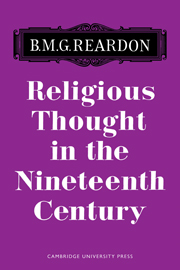Book contents
- Frontmatter
- Preface
- Contents
- Introduction
- PART I EUROPEAN
- PART II BRITISH AND AMERICAN
- 1 Coleridge
- 2 F. D. Maurice
- 3 Newman
- 4 Mansel
- 5 J. S.Mill
- 6 Benjamin Jowett and Essays and Reviews
- 7 Matthew Arnold
- 8 Scott Holland and Lux Mundi
- 9 The British Hegelians
- 10 Emerson
- 11 Josiah Royce
- 12 William James
- Index of Works Cited
- Frontmatter
- Preface
- Contents
- Introduction
- PART I EUROPEAN
- PART II BRITISH AND AMERICAN
- 1 Coleridge
- 2 F. D. Maurice
- 3 Newman
- 4 Mansel
- 5 J. S.Mill
- 6 Benjamin Jowett and Essays and Reviews
- 7 Matthew Arnold
- 8 Scott Holland and Lux Mundi
- 9 The British Hegelians
- 10 Emerson
- 11 Josiah Royce
- 12 William James
- Index of Works Cited
Summary
Emerson, said Matthew Arnold, addressing an American audience, ‘was your Newman, your man of soul and genius, speaking to your bodily ears, a present object for your heart and imagination’. Any close resemblance between the two is not, however, easy to establish and need not be attempted. But Emerson compares with the great ecclesiastical leader at least in his power to command a devoted following. He also was an eloquent prose writer, although his poeticizing rhetoric is harder to appreciate in our day than it was in his own. Like Carlyle, moreover, whom he greatly admired, he is a prophet whose message no longer stirs us. But no American religious thinker of his time had anything like his influence or enjoyed such general esteem.
Born, in 1803, the son of a Unitarian minister, Ralph Waldo Emerson was educated at the Boston Latin School and at Harvard University. At first, though an omnivorous reader, he showed no special intellectual promise. In 1819 he began to keep a journal whose entries testify at once a youthful romanticist ardour and a New England conscience. He himself entered the Unitarian ministry, but doubts and mental depression, accentuated if not brought on by the deaths of his young wife and his two favourite brothers, Charles and Edward, combined with his own none too robust physical health to cause him to abandon it in 1832. Free now of professional responsibilities he was able to visit Europe, and whilst in Britain he met Landor, Coleridge, Wordsworth and Carlyle, the last of whom alone seriously impressed him.
- Type
- Chapter
- Information
- Religious Thought in the Nineteenth Century , pp. 374 - 380Publisher: Cambridge University PressPrint publication year: 1966

